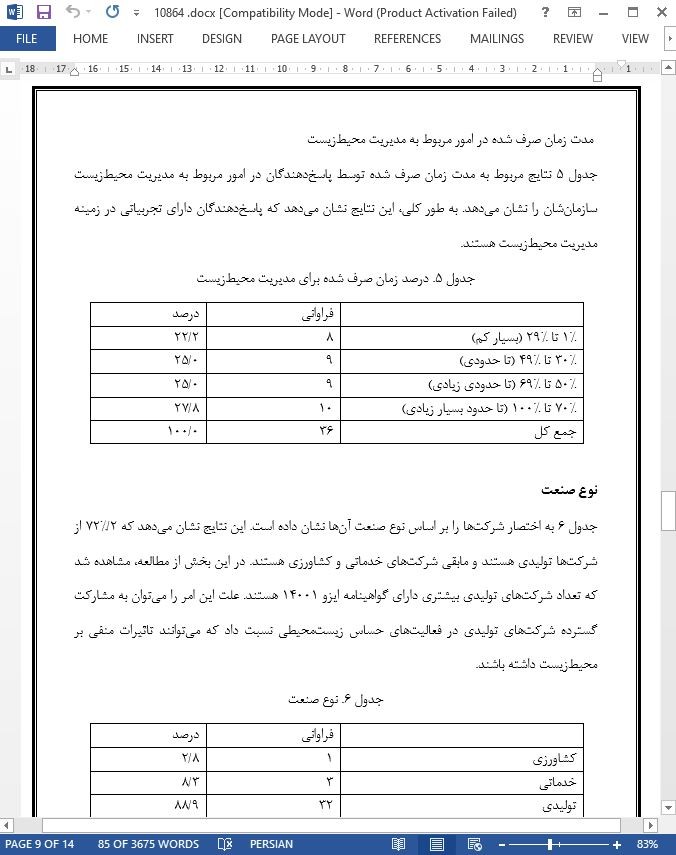
شيوه های حسابداری مدیریت زیست محیطی و رعایت مسئولیت پذیری اجتماعی اسلامی
چکیده
هدف این مقاله بررسی شيوههای حسابداری مدیریت زیستمحیطی، به ویژه فعالیتهای حسابداری مدیریت زیستمحیطی در سازمانهای مالزیایی و همچنین تبیین رعایت اصول شریعت اسلامی در فعالیتهای حسابداری مدیریت زیستمحیطی است. ما به منظور گردآوری دادهها، پرسشنامهای اینترنتی برای همه سازمانهایی نامشان در فدراسیون تولیدکنندگان مالزی (FMM) ثبت شده است و گواهینامه ایزو 14001 دریافت نمودهاند ارسال کردیم. نتایج تحقیق ما نشان میدهد که این سازمانها تا حدود زیادی شيوههای حسابداری مدیریت زیستمحیطی را اجرا نمودهاند. اجرای شيوههای حسابداری مدیریت زیستمحیطی میتواند راهکاری مفید برای حل مسائل حسابداری مدیریت سنتی باشد که قادر به شناسایی و حذف هزینههای پنهان زیستمحیطی نیست.
1. مقدمه
انسان در برابر خدا مسئول است و به عنوان جانشین او بر روی زمین عهدهدار حفاظت از محیطزیست است. این اصل تلویحا به این معنا است که هر انسانی در انجام فعالیتهای فردی و سازمانی روزمره خود باید تقوی و ارزشهای اسلامی را رعایت نماید. صاحبنظران مسلمان و غیرمسلمان نظرات خود را راجع به حسابداری و محیطزیست از دیدگاه اسلام بیان نمودهاند. طبق گفته احمد (2012) حسابداری از دیدگاه اسلام موضوعی است که به تازگی توجه اندیشمندان مسلمان را به خود جلب کرده است. اخيرا جانستون (2012) گفته است که اکثر اندیشمندان مسلمان، طرفدار استفاده از نقش قوانین اسلامی سنتی برای بررسی و حل مسائل زیستمحیطی فعلی هستند. بنابراین، با توجه به این قضیه، این مقاله قصد دارد به تبیین شيوههای حسابداری مدیریت زیستمحیطی، و پيروى آن از اصول شریعت اسلامی بپردازد.
4.3. فعالیتهای حسابداری مدیریت زیستمحیطی و شيوههای مسئولیتپذیری اجتماعی شرکت
این10 مورد از اعم فعالیتهای حسابداری مدیریت زیستمحیطی، در برابر اولویتبندی مسئولیتپذیری اجتماعی اسلامی شرکت در جدول 8 قرار داده شدهاند. هدف از این کار، تعیین انطباق فعالیتهای حسابداری مدیریت زیستمحیطی با مسئولیتپذیری اجتماعی اسلامی شرکت بوده است. مقایسه این دو موضوع نشان داد که فعالیتهای حسابداری مدیریت زیستمحیطی تا حدودی بر مسئولیتپذیری اجتماعی اسلامی شرکت انطباق دارند؛ به ویژه در بخشهای اصلی 1 (خطمشیهای زیستمحیطی)، 2 (مصرف انرژی)، و 3 (پیشگیری از آلودگی محیطزیست).
Abstract
The purpose of this paper is to explore the environmental management accounting practices, specifically the environmental management accounting activities within Malaysian organizations as well as to shed some light on environmental management accounting activities compliance with Shariah principles. An online questionnaire for data collection was deployed to all ISO 14001 certified Malaysian organizations registered with the Federation of Malaysian Manufacturing (FMM). The survey revealed that these organizations to a great extent, have implemented environmental management accounting practices. The implementation of environmental management accounting practices might be beneficial to overcome the problem of traditional management accounting which fails to incorporate environmental hidden costs.
1. Introduction
Mankind is accountable to Allah and as Khalifah on the earth is entrusted to protect the environment. To drive day-to-day individual and organizational activities, the underlying premise is to embed in oneself the self-righteous and values in accordance to Islam. Muslim and non-Muslim scholars have contributed their thoughts on accounting and environment from Islamic perspective. According to Ahmed (2012), accounting from Islamic perspective is an area which has recently attracts Muslim scholars to ponder upon. Recently, Johnston (2012) suggests that majority of Muslim scholars favour some role of traditional Islamic law to address the current environmental issues. Thus, under this premise this paper aims to shed some light on environmental management accounting practices and its compliance with Shariah principles.
4.3 Environmental management accounting activities and i-csr practice
The top ten environmental management accounting activities are mapped with the Prioritization of i-CSR as shown in Table 8. The aim is to determine whether the environmental management accounting activities carried out are in line with the recommended i-CSR practice. The mapping of the two practices revealed that the environmental management accounting activities to a certain extent do subscribed to the i-CSR practice; specifically in terms of Key Areas 1 (Environmental Related Policy), 2 (Energy Consumption) and 3 (Prevention of Pollution).

چکیده
1. مقدمه
2. مرور ادبیات تحقیق
3. روش تحقیق
4. یافتهها و تشريح مطالب
4.1. پیشینه پاسخدهندگان
4.2. فعالیتهای حسابداری مدیریت زیستمحیطی
4.3. فعالیتهای حسابداری مدیریت زیستمحیطی و شيوههای مسئولیتپذیری اجتماعی شرکت
5. نتیجهگیری
Abstract
1. Introduction
2. Literature Review
3. Research Method
4. Results and Discussion
4.1 Background of respondents
4.2. Environmental management accounting activities
4.3 Environmental management accounting activities and i-csr practice
5. Conclusion
- اصل مقاله انگلیسی با فرمت ورد (word) با قابلیت ویرایش
- ترجمه فارسی مقاله با فرمت ورد (word) با قابلیت ویرایش، بدون آرم سایت ای ترجمه
- ترجمه فارسی مقاله با فرمت pdf، بدون آرم سایت ای ترجمه
